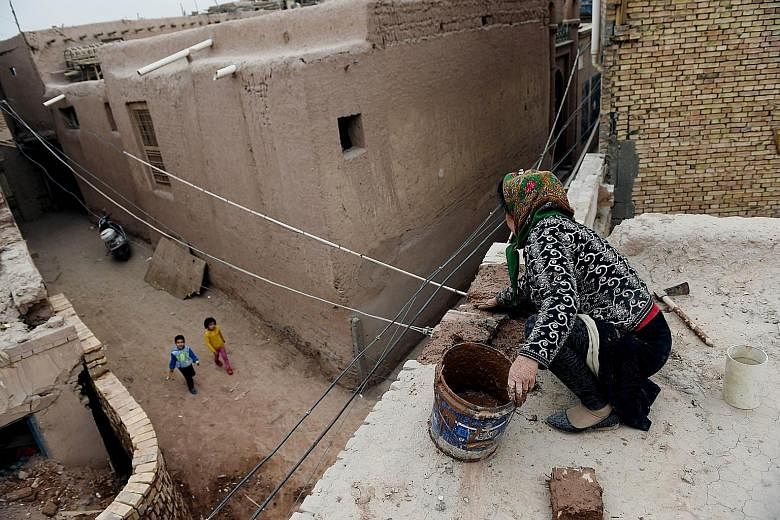KASHGAR • The Silk Road trading centre of Kashgar has been Muslim for centuries, but despite hordes of people thronging the main bazaar, Gulnur's headscarf shop had barely any customers.
As violence increased last year in China's far western region of Xinjiang, home to mostly Muslim Uighurs, the authorities banned veils and other Islamic coverings - wreaking havoc on her business.
"We're all branded as terrorists because of a few bad people," said Ms Gulnur, who is Uighur. "The Chinese don't understand that we're not all the same. Regulations like this will only alienate people," she added.
It is an example of the challenges Beijing faces pacifying the region, where Uighurs accuse the Chinese government of discrimination and restrictions on language, culture and religion. The authorities blame the violence - which has increased in intensity and spread beyond the region in recent years, with more than 200 people killed last year - on Islamist separatists.
The latest violence erupted on Monday when Chinese police in the city of Shenyang shot dead three knife-wielding Uighur militants said to have been screaming for Islamic holy war. They wounded another as they tried to resist arrest, the government and state media said.
"When police pursued the terrorist suspects, four terrorists armed with knives resisted arrest. Police fired shots only after the terrorists ignored warnings," the Shenyang public security bureau said on its official microblog late on Monday.
The state-run Beijing News, citing the Liaoning provincial government, said the militants from Xinjiang were killed on Monday afternoon after police tried to enter a rented house during a raid. "When the police tried to enter to investigate, four terrorists wearing headgear, holding knives and crying out 'jihad' hacked at the police," the Beijing News said.
Three "accompanying children" were apprehended as well as a woman from southern Xinjiang, it said.
But Mr Dilxat Raxit, a spokesman for the exile group World Uyghur Congress, said that about a dozen Uighurs were trying to flee China when they were caught by police in Shenyang.
"The accusation that they are suspected terrorists exposes China's hostile and discriminatory attitude," he said by e-mail.
Hundreds, perhaps thousands, of Uighurs have left China in recent years, illegally crossing into Southeast Asia and then on to Turkey. Rights groups say they are mostly fleeing the violence in Xinjiang and Chinese controls on their religion and culture.
The government says they are seeking to go to Iraq and Syria to fight with extremist groups like the Islamic State in Iraq and Syria.
In the past year, many forms of Islamic dress have been banned and beards ruled out for young and middle-aged men as Beijing roots out what it calls "religious extremism".
Posters list the prohibited "five abnormal appearances": face veils, burqas, young women in tight headscarves, the beard restrictions, and any clothing with a crescent moon and star logo like the Turkish flag.
Taxis are not allowed to pick up customers wearing banned items. The city of Karamay has barred them from public transport. And a man from Kashgar was jailed for six years in March for growing a beard and his burqa-wearing wife sentenced to two years, reports said.
Beijing insists that more conservative forms of dress are foreign imports from the Middle East and not part of Uighur culture.
In cities across Xinjiang, Uighurs and Han Chinese residents live almost entirely separately, with a heavy security presence in places frequented by Han and tourists.
The increase in violence has hurt businesses, with tourist numbers down nearly 5 per cent last year.
Mr Eminjan, a seller of traditional knives, said most of his business dried up after a group of Uighurs stabbed 31 people to death at a station in Kunming in March last year.
"These knives are not illegal, and they're a part of Uighur history," he said. "But if the police search you and find one, especially for young men, it will bring you a lot of hassle."
AGENCE FRANCE-PRESSE, REUTERS

